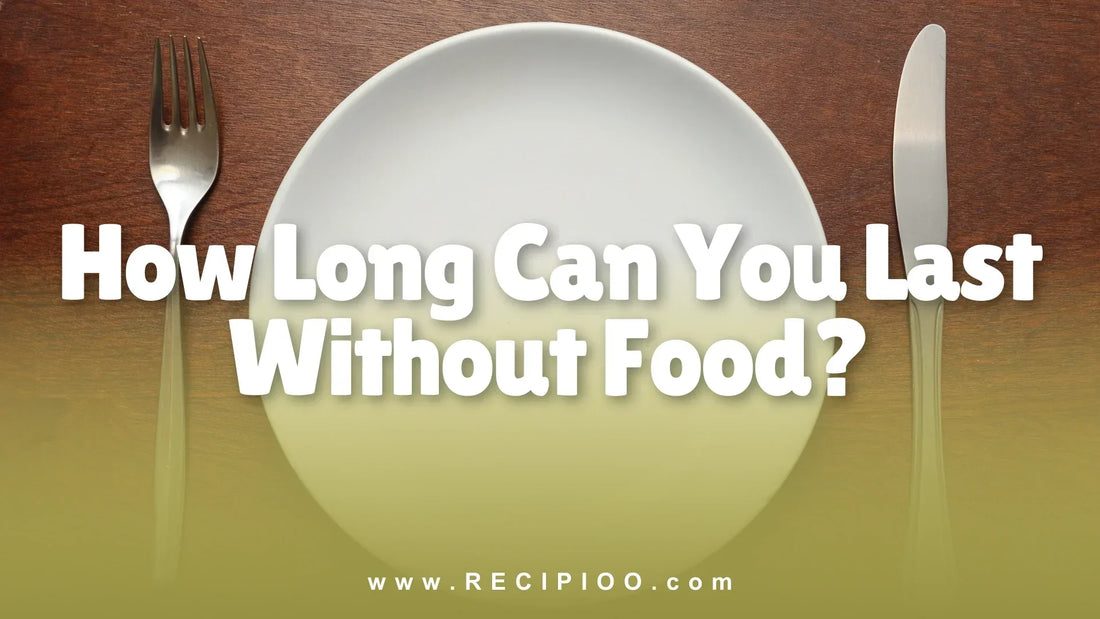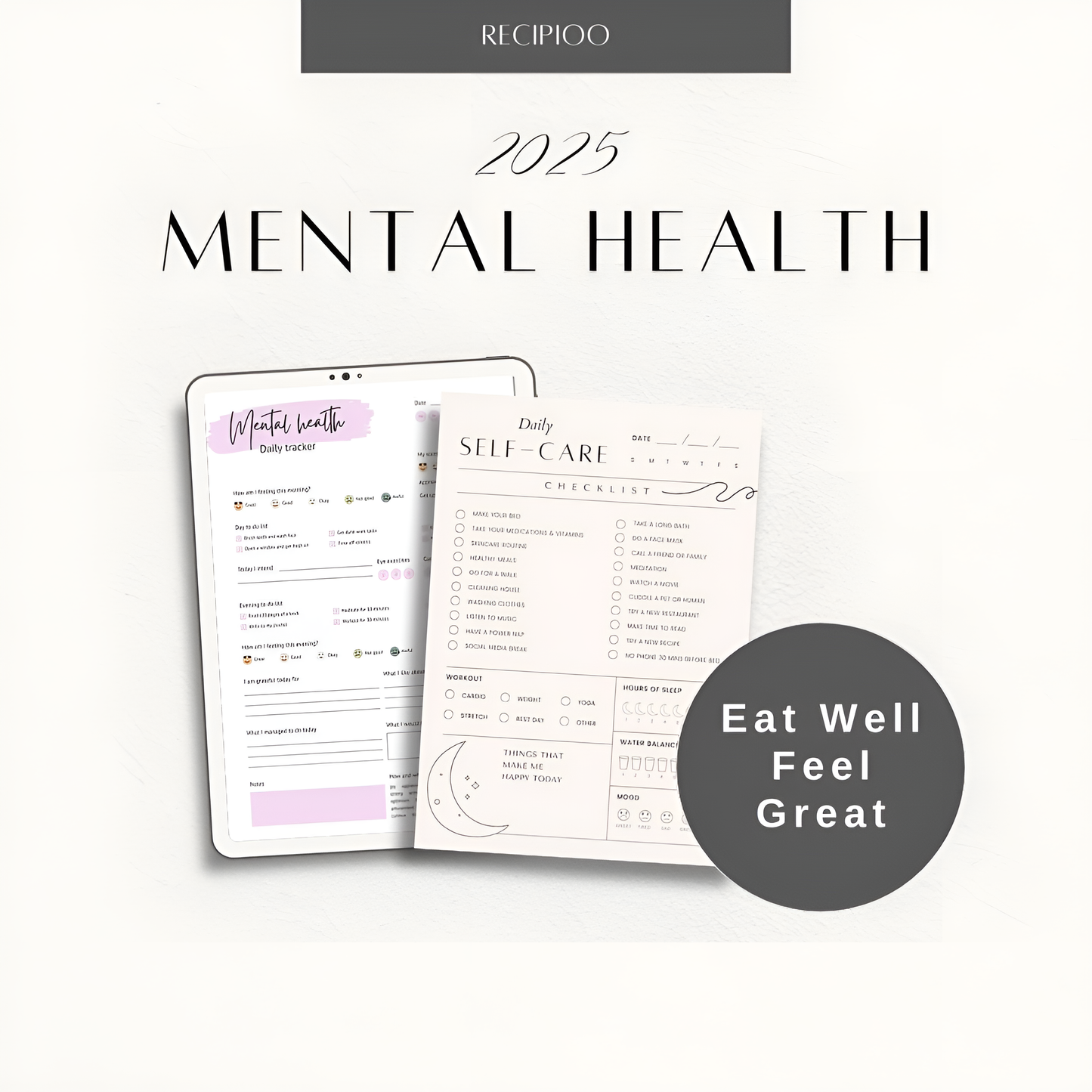
How Long Can You Last Without Food?
Share

Have you ever wondered how long your body can survive without food? Whether you're curious about the science behind starvation, the effects of fasting, or the human body's limits, this guide will answer all your questions. Understanding how long you can last without food isn’t just about survival—it’s about knowing how your body responds to extreme conditions and what factors influence your ability to endure.
How Long Can a Human Survive Without Food?
The human body is a marvel of adaptation, but it has its breaking point. Without food, most people can survive for 1 to 2 months, depending on factors like hydration, body composition, and overall health. However, this timeline isn’t universal—some may last longer, while others may succumb sooner.
Historical Examples and Scientific Studies
History provides striking examples of human endurance. Mahatma Gandhi, for instance, survived 21 days without food during a hunger strike, relying solely on water. Similarly, survival stories from extreme situations, such as lost hikers or shipwreck survivors, show that the human body can endure weeks without food under dire circumstances.
Scientific studies on starvation, such as the Minnesota Starvation Experiment, have also shed light on the body’s response to prolonged food deprivation. Participants in the study experienced severe physical and psychological effects after just 12 weeks of restricted caloric intake, highlighting the toll starvation takes on the body.
The Role of Water
While this section focuses on food, it’s impossible to ignore the role of water in survival. Without water, the body can only last 3 to 4 days before dehydration leads to organ failure. Water is essential for maintaining vital functions, and its absence drastically shortens survival time. So, while food is critical, water is even more so.
Factors That Influence Survival Without Food
Survival without food isn’t a one-size-fits-all scenario. Several factors determine how long you can last, and understanding these can help you grasp the complexities of starvation.
Body Composition
Your body’s composition plays a significant role in survival. Fat reserves act as an energy store, while muscle mass provides protein that the body can break down for fuel. People with higher body fat percentages may last longer because their bodies have more energy reserves to tap into. Conversely, individuals with lower body fat may deplete their energy stores more quickly.
Metabolism also matters. Those with faster metabolisms burn through energy reserves more rapidly, while slower metabolisms may extend survival time. However, a slower metabolism isn’t always an advantage—it can also lead to other complications, such as reduced body temperature in cold environments.
Hydration
Even without food, staying hydrated can extend your survival. Water is essential for maintaining bodily functions like circulation, digestion, and temperature regulation. Dehydration, on the other hand, can lead to organ failure within days. If you’re in a survival situation, prioritizing water intake is crucial.
Health Conditions
Pre-existing health conditions can significantly impact how long you can survive without food. For example:
Diabetes: Without food, blood sugar levels can drop dangerously low, leading to hypoglycemia and potential coma.
Heart Disease: Starvation places additional strain on the heart, increasing the risk of cardiac arrest.
Kidney Problems: Dehydration and nutrient deficiencies can exacerbate kidney issues, leading to organ failure.
If you have any chronic health conditions, your ability to survive without food may be severely compromised.
Environmental Factors
Your surroundings play a critical role in survival. Extreme temperatures, for instance, can accelerate the effects of starvation:
Cold Environments: Your body burns more energy to stay warm, depleting reserves faster.
Hot Climates: Dehydration becomes a greater risk, shortening survival time.
Physical activity levels also matter. If you’re exerting yourself—whether by hiking, running, or performing manual labor—you’ll burn through energy reserves more quickly. In contrast, conserving energy by resting can help prolong survival.
Age and Gender
Age and gender influence survival rates as well. Younger individuals typically have more resilient bodies, while older adults may struggle due to weaker immune systems and slower metabolism. Women, on average, tend to have higher body fat percentages, which may provide a slight survival advantage. However, these differences are not absolute and depend on individual health and circumstances.
By understanding these factors, you can better appreciate the complexities of survival without food. Whether it’s your body composition, hydration levels, or the environment you’re in, each element plays a crucial role in determining how long you can last. In the next sections, we’ll explore what happens to your body during starvation and answer common questions about this topic. Stay tuned!
What Happens to the Body During Starvation?
Starvation isn’t an instant process; it’s a gradual decline that unfolds in distinct stages. Each stage brings new physical and mental challenges as your body struggles to cope with the lack of nutrients. Here’s what happens step by step:
Stage 1: Glycogen Depletion (First 24-48 Hours)
When you stop eating, your body first turns to its most readily available energy source: glycogen. Glycogen is a form of stored glucose found in your liver and muscles. During the first 24 to 48 hours, your body breaks down glycogen to keep your blood sugar levels stable and provide energy for your brain and muscles.
What You’ll Experience:
Fatigue: As glycogen stores deplete, you’ll feel increasingly tired and sluggish.
Irritability: Low blood sugar can make you moody and short-tempered.
Hunger Pangs: Your stomach may growl, and you’ll feel intense hunger as your body signals for food.
This stage is relatively mild, but it sets the foundation for what’s to come. Once glycogen is gone, your body must find another way to fuel itself.
Stage 2: Ketosis (After 2-3 Days)
Once glycogen is depleted, your body shifts to burning fat for energy. This process, known as ketosis, involves breaking down fat stores into molecules called ketones, which can be used as an alternative fuel source.
What You’ll Experience:
Bad Breath: Ketones have a distinct smell, often described as fruity or acetone-like, which can cause bad breath.
Nausea and Dizziness: The shift to ketosis can make you feel queasy or lightheaded.
Mental Fog: Your brain, which prefers glucose, may struggle to adapt to ketones, leading to difficulty concentrating.
While ketosis can sustain you for a while, it’s not a long-term solution. Your body will eventually run out of fat reserves, forcing it to turn to other sources of energy.
Stage 3: Protein Breakdown (After 1-2 Weeks)
When fat reserves are significantly depleted, your body begins to break down protein for energy. Protein is found in your muscles, organs, and tissues, and breaking it down has serious consequences.
What You’ll Experience:
Muscle Wasting: Your body starts consuming its own muscle tissue, leading to weakness and a gaunt appearance.
Organ Damage: Vital organs, including your heart and liver, begin to deteriorate as their proteins are broken down.
Severe Fatigue: With less muscle mass and energy, even simple tasks become exhausting.
Mental Decline: Cognitive function deteriorates, leading to confusion, memory loss, and difficulty making decisions.
This stage is dangerous and marks the beginning of severe physical and mental decline. Without intervention, your body will continue to cannibalize itself.
Stage 4: Organ Failure (After Several Weeks)
In the final stage of starvation, your body’s vital systems begin to shut down. The lack of nutrients and energy takes a toll on your organs, leading to irreversible damage.
What You’ll Experience:
Heart Failure: Your heart muscle weakens, leading to irregular heartbeats and potential cardiac arrest.
Liver and Kidney Failure: These organs can no longer filter toxins from your blood, causing a buildup of waste products.
Immune System Collapse: Your body becomes unable to fight off infections, making you vulnerable to diseases.
Coma and Death: Without immediate medical intervention, organ failure leads to coma and, ultimately, death.
This stage is the most critical and often irreversible. By this point, survival depends on urgent medical care and refeeding under strict supervision.
Common Questions About Starvation
Can You Survive Longer Without Food if You Drink Water?
Absolutely. Water is essential for survival, and drinking it can significantly extend the time you can go without food. While food provides energy, water is critical for maintaining vital bodily functions like circulation, digestion, and temperature regulation. Without water, dehydration sets in quickly, leading to organ failure and death within 3 to 4 days.
The Role of Water:
Hydration: Water keeps your cells functioning and helps transport nutrients and waste products.
Energy Production: Even without food, water supports metabolic processes that keep you alive.
Temperature Control: Water helps regulate your body temperature, which is especially important in extreme environments.
The Dangers of Dehydration:
Early Symptoms: Thirst, dry mouth, and dark urine.
Severe Symptoms: Confusion, rapid heartbeat, and fainting.
Organ Failure: Without water, your kidneys, heart, and brain can shut down.
In short, while food is important, water is non-negotiable. If you’re in a survival situation, prioritize finding and drinking clean water.
What Are the First Signs of Starvation?
Starvation doesn’t happen overnight—it’s a gradual process with distinct early warning signs. Recognizing these symptoms can help you understand when your body is in distress.
Early Symptoms:
Fatigue: You’ll feel unusually tired as your energy reserves dwindle.
Dizziness: Low blood sugar can make you lightheaded or unsteady.
Weakness: Simple tasks may feel exhausting as your muscles lack fuel.
Irritability: Hunger can affect your mood, making you short-tempered or anxious.
Brain Fog: Difficulty concentrating or thinking clearly is common.
How Your Body Signals for Food:
Your body is designed to alert you when it needs nutrients. Hunger pangs, stomach growling, and cravings are all signals that it’s time to eat. Ignoring these signs for too long pushes your body into starvation mode, where it begins breaking down its own tissues for energy.
How Does Starvation Affect the Brain?
Your brain is one of the first organs to feel the effects of starvation. It relies heavily on glucose for energy, and when that’s in short supply, cognitive function takes a hit.
Cognitive Decline:
Difficulty Concentrating: You may find it hard to focus or complete tasks.
Memory Problems: Short-term memory can suffer, making it difficult to recall recent events.
Mood Changes: Irritability, anxiety, and depression are common as your brain struggles to function.
Long-Term Effects:
Brain Shrinkage: Prolonged starvation can lead to a loss of brain mass, particularly in areas responsible for memory and decision-making.
Neurological Damage: In severe cases, starvation can cause permanent damage to the brain, affecting your ability to think, learn, and process emotions.
Starvation doesn’t just weaken your body—it takes a toll on your mind as well. Protecting your brain requires proper nutrition and hydration.
Can You Die from Starvation in a Week?
While it’s rare, death from starvation within a week is possible under extreme conditions. Most people can survive for several weeks without food, but certain factors can accelerate the process.
Contributing Factors:
Dehydration: Without water, death can occur in as little as 3 to 4 days.
Health Conditions: Pre-existing issues like diabetes or heart disease can worsen the effects of starvation.
Environmental Stress: Extreme heat or cold can increase energy expenditure and dehydration.
The Timeline:
Days 1-3: Your body uses glycogen for energy, leading to fatigue and irritability.
Days 4-7: Ketosis begins, but without water, dehydration becomes life-threatening.
Beyond a Week: Organ failure becomes a real risk, especially if you’re also dehydrated.
In most cases, death within a week is unlikely, but it’s not impossible. Extreme circumstances can push your body to its limits faster than you might expect.
Is It Safe to Go Without Food for a Few Days?
Short-term fasting, such as going without food for 24 to 72 hours, is generally safe for healthy individuals. In fact, some people practice intermittent fasting for its potential health benefits, like improved insulin sensitivity and weight management.
Effects of Short-Term Fasting:
Energy Levels: You may feel tired or sluggish as your body adjusts.
Mental Clarity: Some people report improved focus and mental clarity during fasting.
Hunger: Hunger pangs are common but usually subside after the first day.
Fasting vs. Starvation:
Fasting: A controlled, short-term practice where you abstain from food for a set period. It’s usually safe and can have health benefits.
Starvation: An involuntary, prolonged lack of food that leads to severe physical and mental decline. It’s dangerous and should be avoided.
If you’re considering fasting, consult a healthcare professional to ensure it’s safe for you. For most people, short-term fasting is manageable, but prolonged starvation is never recommended.
The Role of Vitamins and Minerals During Starvation
When you stop eating, your body not only loses its primary source of energy but also its supply of essential nutrients. Vitamins, minerals, and electrolytes play vital roles in keeping your body functioning, and their depletion can accelerate the negative effects of starvation.
How Nutrient Deficiencies Worsen Starvation Effects
Vitamin Deficiencies
Vitamin B1 (Thiamine): A lack of thiamine can lead to beriberi, a condition that affects the heart and nervous system. Symptoms include fatigue, confusion, and muscle weakness.
Vitamin C: Without vitamin C, your body can’t produce collagen, leading to scurvy. Symptoms include bleeding gums, joint pain, and slow wound healing.
Vitamin D: Deficiency weakens your bones and immune system, making you more susceptible to infections and fractures.
Mineral Deficiencies
Potassium: Low potassium levels can cause muscle cramps, irregular heartbeats, and even heart failure.
Magnesium: A lack of magnesium affects nerve and muscle function, leading to tremors, seizures, and muscle weakness.
Iron: Iron deficiency results in anemia, causing fatigue, shortness of breath, and pale skin.
Electrolyte Imbalances
Electrolytes like sodium, potassium, and chloride are essential for maintaining fluid balance, nerve function, and muscle contractions. During starvation, electrolyte imbalances can lead to:
Dehydration: Even if you’re drinking water, a lack of electrolytes can prevent proper hydration.
Muscle Cramps: Low levels of potassium and magnesium cause painful muscle contractions.
Heart Problems: Severe imbalances can lead to arrhythmias or cardiac arrest.
The Importance of Micronutrients
Micronutrients, though needed in small amounts, are crucial for survival. They support everything from energy production to immune function. Without them, your body struggles to perform even basic tasks, accelerating the physical and mental decline associated with starvation.
How to Recover from Starvation
Recovering from starvation is a delicate process that requires careful planning and medical supervision. Your body has been through significant stress, and reintroducing food too quickly can lead to serious complications. Here’s what you need to know about the refeeding process and how to recover safely.
The Refeeding Process
Refeeding is the gradual reintroduction of food after a period of starvation. It’s a critical step in recovery, but it must be done carefully to avoid refeeding syndrome, a potentially fatal condition caused by sudden shifts in fluids and electrolytes.
What Is Refeeding Syndrome?
Refeeding syndrome occurs when your body, deprived of nutrients for an extended period, struggles to metabolize food. The sudden influx of nutrients can cause:
Electrolyte Imbalances: Rapid shifts in potassium, magnesium, and phosphate levels.
Fluid Overload: Your body may retain too much fluid, leading to swelling and heart strain.
Organ Failure: Severe cases can result in heart, kidney, or respiratory failure.
Symptoms of Refeeding Syndrome
- Weakness or fatigue
- Difficulty breathing
- Swelling in the legs or abdomen
- Confusion or seizures
Guidelines for Safe Recovery
To avoid refeeding syndrome and ensure a safe recovery, follow these guidelines:
Start Slowly
- Begin with small, frequent meals that are easy to digest, such as soups, broths, or mashed vegetables.
- Avoid high-sugar or high-fat foods initially, as they can overwhelm your system.
Focus on Nutrient-Dense Foods
- Prioritize foods rich in vitamins, minerals, and electrolytes, such as bananas (potassium), leafy greens (magnesium), and lean proteins (iron).
- Include sources of healthy fats and carbohydrates to restore energy levels gradually.
Monitor Electrolytes
- Work with a healthcare provider to monitor your electrolyte levels and address imbalances promptly.
- Supplements may be necessary to replenish depleted nutrients.
Stay Hydrated
- Drink plenty of water, but avoid overhydration, which can dilute electrolytes and worsen imbalances.
Seek Medical Supervision
- Recovery from starvation is complex and requires professional guidance. A doctor or dietitian can create a personalized refeeding plan and monitor your progress.
Long-Term Recovery
Recovering from starvation isn’t just about regaining weight—it’s about rebuilding your health. This process can take weeks, months, or even years, depending on the severity of starvation. Be patient with your body and prioritize:
Balanced Nutrition: Eat a variety of foods to ensure you’re getting all the nutrients you need.
Mental Health: Starvation can take a toll on your mind, so consider counseling or therapy to address any psychological effects.
Physical Activity: Gradually reintroduce exercise to rebuild strength and stamina.
FAQs About How Long Can You Last Without Food?
How Long Can You Survive Without Food but With Water?
With adequate water intake, most people can survive for 1 to 2 months without food. Water is essential for maintaining vital bodily functions, such as circulation, digestion, and temperature regulation. While food provides energy, water keeps your cells hydrated and your organs functioning.
Key Points:
Water’s Role: Water helps transport nutrients, remove waste, and regulate body temperature.
Survival Timeline: Without food but with water, your body can rely on fat and muscle reserves for energy, extending survival time.
Limitations: Even with water, prolonged starvation leads to muscle wasting, organ damage, and eventually death.
In short, water is your lifeline. If you’re in a survival situation, prioritize finding and drinking clean water to extend your survival time.
What Happens If You Don’t Eat for 3 Days?
Going without food for 3 days is challenging but manageable for most healthy individuals. During this time, your body undergoes several changes as it adapts to the lack of food.
What to Expect:
Day 1: Your body uses glycogen (stored glucose) for energy. You may feel tired, irritable, and hungry.
Day 2: Glycogen stores are depleted, and your body begins burning fat for energy. You might experience bad breath, nausea, and mental fog as ketosis sets in.
Day 3: Fat burning continues, and you may feel weaker and more fatigued. Hunger pangs may subside, but mental clarity can decline.
Is It Safe?
For most people, fasting for 3 days is safe, especially if you stay hydrated. However, if you have underlying health conditions, such as diabetes or heart disease, fasting can be risky. Always consult a healthcare professional before attempting a prolonged fast.
Can You Survive Without Food for 40 Days?
Surviving without food for 40 days is rare but possible under specific conditions. Historical examples, such as hunger strikes and extreme survival situations, show that some individuals have endured this long without food.
Factors That Influence Survival:
Body Fat: Individuals with higher body fat percentages may last longer because their bodies have more energy reserves.
Hydration: Drinking water is essential for extending survival time.
Health: Pre-existing conditions can shorten survival time.
Risks:
Organ Damage: Prolonged starvation leads to muscle wasting, organ failure, and irreversible damage.
Death: Without intervention, survival beyond 40 days is unlikely.
While it’s possible to survive without food for 40 days, it’s extremely dangerous and not recommended. Your body will suffer severe consequences, and the risk of death is high.
What Are the Long-Term Effects of Starvation?
Starvation doesn’t just affect you in the short term—it can have lasting impacts on your body and mind. Even after recovery, the effects of prolonged food deprivation can linger.
Physical Effects:
Muscle Wasting: Loss of muscle mass can lead to long-term weakness and mobility issues.
Organ Damage: Starvation can cause permanent damage to the heart, liver, and kidneys.
Bone Loss: Nutrient deficiencies weaken bones, increasing the risk of fractures and osteoporosis.
Mental Effects:
Cognitive Decline: Prolonged starvation can impair memory, focus, and decision-making.
Mental Health Issues: Anxiety, depression, and other psychological conditions are common after starvation.
Recovery Challenges: Recovering from starvation takes time and requires proper nutrition, medical care, and emotional support. Even with treatment, some effects may be irreversible.
Is Fasting the Same as Starvation?
No, fasting and starvation are not the same. While both involve going without food, they differ in purpose, duration, and effects on the body.
Fasting:
Controlled Practice: Fasting is a voluntary, short-term practice where you abstain from food for a set period.
Health Benefits: Intermittent fasting can improve insulin sensitivity, support weight loss, and promote cellular repair.
Safety: For healthy individuals, fasting is generally safe and can be part of a balanced lifestyle.
Starvation:
Involuntary Deprivation: Starvation is an involuntary, prolonged lack of food that leads to severe physical and mental decline.
Health Risks: Starvation causes muscle wasting, organ damage, and can be life-threatening.
Purpose: Unlike fasting, starvation is not a choice and often results from extreme circumstances like famine or illness.
In summary, fasting is a controlled practice with potential health benefits, while starvation is a dangerous condition that requires immediate intervention.
RECIPIOO SOURCES
At Recipioo, we are committed to providing you with reliable, well-researched, and trustworthy content. Our team follows rigorous sourcing guidelines, drawing from reputable studies, expert insights, and credible sources to ensure the accuracy and integrity of our information. We believe in empowering you with knowledge you can trust, whether it’s about nutrition, recipes, or healthy living.











